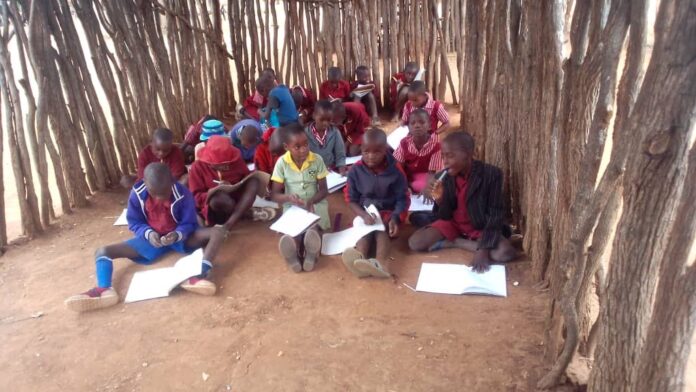The right to access appropriate and proper education for children is a constitutional guarantee which is precisely defined in Section 19 (1) of the national constitution which outlines that in matters relating to children, the State ought to take measures to ensure that their best interests are taken good care of.
However, for about 230 pupils currently enrolled at Chikokoko Primary School in Mwenezi East’s remote ward 13, the right to decent education does not exist as pupils are conducting lessons under unimaginable conditions.
The satellite school which was established in the wake of the Land Reform Programme has since its inception in 2003 been operating without a single classroom block.
During lessons, several pupils sit on the ground under makeshift structures built of wooden poles and dagga with grass thatched roofs.
Local village head, Selina Mandindani who is also the School Development Committee (SDC) member bemoaned the long forgotten innocent pupils’ plight saying several parents are no longer seeing the value of sending their school children to Chikokoko Primary School.
“We are really in dire need of assistance at the school as pupils are learning under one of the worst conditions. Teachers do not stay longer before they transfer due to unbearable conditions here.
“The school’s drop-out rate is very alarming. Currently the grade seven class is composed of a total of eight learners. Grades are combined to cater for the seriously under-staffed school which has a total of only four female teachers. The community here is seeing no value in sending pupils to school.
“We are just grooming cattle herds, domestic workers and child brides. We do not have any single classroom block and teachers and pupils are sharing two toilets, one for male and the other one for females, which are the only ones available for the entire school. There are no any teacher’s houses to talk about except some shabby sub-standard one-roomed structures for each of the four teachers,” said Mandindani.
In an interview, ward 13 Councillor Takura Mudavose who shared the same sentiments with Mundindani concerning the school’s state also shifted the blame to the local community for the messy the school finds itself in.
“At one point in time I visited the school in the middle of the term and I was surprised to find out that only four pupils had paid their school fees. What worries most is that the surrounding community is completely doing nothing to improve their own school. They do not see the value of education as most of the school drop-outs end up being illegal immigrants working in South Africa,” said Mudavose.
On his part, Chief Chitanga born Feleni Chauke who described conditions at Chikokoko as tragic told TellZim News that developments at the school are being hampered by delays in pegging the school to make its site officially permanent.
“Conditions at Chikokoko are not pleasing at all for both teachers and learners. What is compounding the problems is that the Ministry of Lands is yet to peg the school to make its site permanent. We have written some letters to that effect and we are currently pushing to ensure that the issue is given the prominence it deserves.
“Though there are some disputes with regards to the site, I can safely tell you that the said area is under my jurisdiction not Mpapa as claimed by some sections of that society,” said Chief Chitanga.
Mwenezi Rural District Council (RDC) Chief Executive Officer (CEO) Albert Chivanga who acknowledged the absence of classroom blocks at Chikokoko Primary School told Tellzim News in a telephone interview that the other issue derailing development is that some locals are failing to reach consensus on the school’s site.
The entire Mwenezi district has a total of 172 schools, 102 of which are satellites schools such as Mlilo, Dembe, Nyuni, Vezvi, Muvhoko and Bubi which were established in the wake of the Land Reform Programme.

For comments, Feedback and Opinions do get in touch with our editor on WhatsApp: +44 7949 297606.
